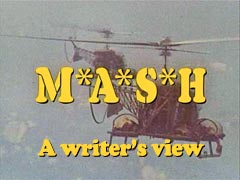M*A*S*H: A writer’s view. #13 in the series.
The last of the comedy doubles on M*A*S*H is a study in opposites. One was a streetwise working-class kid from Toledo; the other was a Boston Brahmin who, the minute he was born, spat out the silver spoon because it was not 14-karat gold. One was the first regular character not taken from Hooker’s novel; the other was the last character added to the cast, and was loosely based on a pair of surgeons who appeared in the book.
Five years into the series’ run, Jim Fritzell and Everett Greenbaum went back to the fountainhead for a scene that would help them with one of their most difficult writing tasks. Near the end of the book, two replacement surgeons arrive at the 4077th: a pair of young Ivy Leaguers fresh out of residency, Captains Emerson Pinkham and Leverett Russell. Col. Blake makes the Swampmen show them the peculiar techniques of meatball surgery, instead of letting them sweat it out and learn for themselves. [Read more…]








Recent Comments